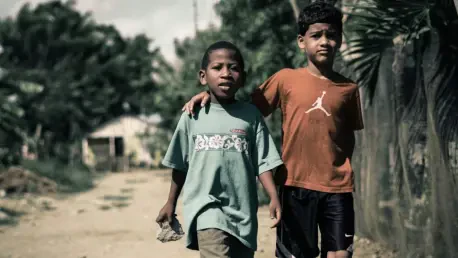In Habersham County, Georgia, the summer months reveal a stark reality for families living below the state’s median income, highlighting the vulnerabilities of children facing poverty. Cornelia’s situation is particularly alarming, where over a quarter of the population grapples with financial instability, and Baldwin witnesses poverty rates soaring above 30%. As school doors close, the absence of academic support intensifies the challenges, creating a childcare chasm for working families striving to provide basic necessities. With affordable childcare and reliable public transportation scarce, children often find themselves in overcrowded homes lacking adequate cooling or wandering unsupervised in their neighborhoods. Food insecurity deepens this crisis, as nearly 88% of local schoolchildren depend on free or reduced lunch programs, benefits that dissolve with the start of summer. Community-led initiatives serve as temporary lifelines, combating the multifaceted issues that intertwine during this seasonal struggle.
Addressing Children’s Nutritional Needs
Food 4 Kids, in partnership with Volunteers for Literacy of Habersham and the local school system, has risen to confront these pressing challenges head-on by implementing a summer program designed to bridge the gap left by school meal programs. Operating from June 2 to July 17, the initiative delivers hot meals, take-home food packages, and literary resources to children at sites including Cornelia Elementary and the Tim Lee Boys & Girls Club. Grab-and-go locations bolster accessibility for families, ensuring that no child faces hunger due to logistical barriers. Furthermore, Volunteers for Literacy enrich the program by offering five books to each child, fostering educational growth and maintaining literacy engagement throughout the summer break. This focused approach not only addresses immediate nutritional needs but also encourages intellectual curiosity and academic continuity during a period when resources are typically constrained. Despite these substantial efforts, the overarching need remains formidable, urging the community to maintain its diligence and commitment.
Creating Safe Spaces for Growth
Beyond nutritional sustenance, local initiatives are eager to cultivate environments where children can thrive safely and develop self-assurance. The Tim Lee Boys & Girls Club exemplifies this approach by providing structured activities and mentorship aimed at promoting positive development. Although its capacity is limited, the club serves as a haven for children seeking guidance and stimulation outside their homes. Similarly, the Cornelia Boxing Academy extends free boxing classes, sponsored by local businesses, fostering a sense of community and encouraging confidence among youth participants. These programs are pivotal in delivering not merely refuge but opportunities for growth and role models deserving of emulation. Such initiatives help fill the void left by insufficient resources, providing life skills and mentorship invaluable in a child’s formative years. Amidst these valiant efforts, the scope of children’s needs continues to exceed available resources, underscoring the necessity for expanded support and systemic change.
Future Directions and Continuing Challenges
In Habersham County, Georgia, the summer months starkly reveal the challenges faced by families living below the state’s median income, especially the children caught in the grip of poverty. In Cornelia, the alarming rate of financial instability affects over a quarter of the population. Meanwhile, Baldwin faces severe challenges, with poverty rates exceeding 30%. As schools close for the summer, the lack of educational support amplifies the struggle, leaving a void in childcare for working families striving to meet basic needs. The scarcity of affordable childcare and reliable public transportation often forces children into crowded homes without adequate cooling or leaves them wandering unsupervised. Food insecurity worsens as about 88% of schoolchildren rely on free or reduced lunches, benefits that vanish once school is out. In response, community-led efforts act as vital supports, addressing the intertwined issues that escalate during the summer, offering a semblance of relief to these vulnerable families.









